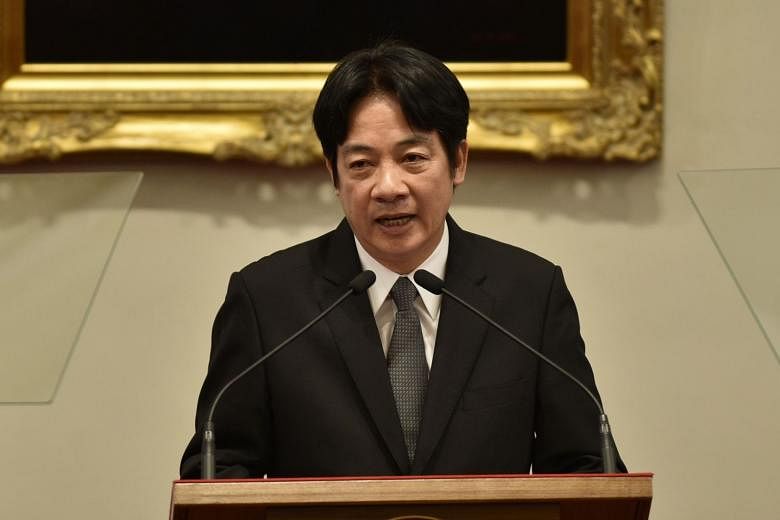TAIPEI (REUTERS) - Taiwan's new premier William Lai Ching-te said on Friday (Sept 8) that he will work towards luring greater investment to the self-ruled island, while sticking to the policies of the ruling Democratic Progressive Party (DPP).
Lai, formerly the mayor of the south-western city of Tainan, made the remarks at a Cabinet transition ceremony following the resignation this week of his predecessor Lin Chuan. .
The reshuffle, at a time of low public approval ratings for President Tsai Ing-wen, will give the government an opportunity to push through legislation with less resistance.
Ratings for Tsai shrank to below 30 per cent by August, a survey by a private foundation showed, down from nearly 70 per cent soon after her landslide election victory in 2016.
"My main responsibility is to build the country, expand the economy and look after the people," said Lai, adding that his Cabinet would press on with reforms in areas ranging from the energy industry to labour, pensions and tax, while "eliminating obstacles for investment". He added that "these will have a pragmatic strategy and will be solved in a steadfast way."
Dissatisfaction with labour and pension reforms are seen to have weighed on Tsai's ratings, sparking occasional protests.
The reshuffle brought several new key appointments, though most of the other ministry-level positions stayed unchanged.
The financial supervisory commission gets a new chief, Wellington Koo, while acting economics minister Shen Jong-chin was confirmed in the role.
A new vice premier and secretary-general were also appointed to the Cabinet, or Executive Yuan.
Lai, a member of Tsai's independence-leaning party, won a landslide reelection in 2014 in Tainan, home to the plants of Taiwan Semiconductor Manufacturing Co (TSMC) and other technology firms.
The Harvard-educated Lai is expected to take a cautious stance in the transition, as shown by his modest personnel changes, analysts say.
"Lai brings an effective administrative style, and will seek to keep the agenda on track," said Edward Yang, an associate professor at National Taiwan Normal University.
His popular style also contrasts with that of Lin, who was seen as a less effective communicator, Yang added.
The DPP is striving to shore up its popularity ahead of local elections next year in which it faces off against its main rival, the China-friendly Kuomintang (KMT) party.
Local election results are seen as a harbinger for the presidential election in 2020.

